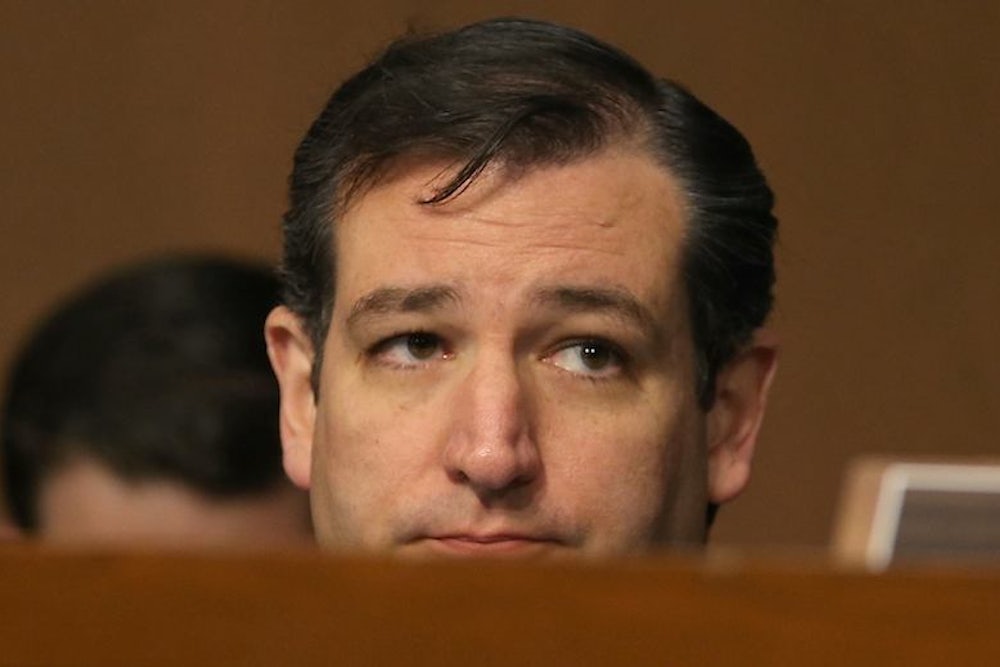On Wednesday, the National Review's Robert Costa reported that freshman Senator Ted Cruz, a tea party favorite from Texas, is considering a presidential campaign. Apparently, Cruz's supporters argue that he would be a “Barry Goldwater type” who could reconnect the party with its base—except with “better electoral results.” Outdoing the GOP's 1964 nominee would not, of course, be much of an accomplishment: Goldwater won only 38 percent of the popular vote against Lyndon Johnson. That's why Costa's report sparked mockery from the left, but there isn’t much reason to think Cruz would seriously underperform another conservative candidate—at least not yet.
"Electability" is a little overrated. The economy has proven to be a more significant variable in presidential elections than ideology, and as partisanship increasingly aligns with ideological preferences, there’s not much room for ideology to cost candidates more than a few points. That’s not to say that a bad candidate couldn’t lose in a landslide, but unelectable candidates haven’t won the Republican nomination because they struggle to attract sufficient establishment support or make costly political errors. I’m open to the possibility that Rick Santorum, Texas Gov. Rick Perry, or Newt Gingrich might have run a couple of points worse than Romney, or perhaps more, but GOP primary voters spared us, just as Democratic primary voters saved us from a Dennis Kucinich campaign. Indeed, Santorum only ran about 4 points worse than Romney in general election polls, even as Santorum staked out his opposition to post-1959 America. Since there aren’t many examples of extreme candidates becoming major party nominees, it’s tough to judge how ideology costs a political party in a presidential election.
If Cruz can win the Republican presidential nomination, I suspect he’ll have proven himself to be a decent enough politician to perform as well as other conservatives, like Mitt a or George W. Bush. Cruz might be earning a bad reputation in the Senate, but he hasn’t adopted many positions far to the right of Romney. He’s not a fire-breather like Representative Michelle Bachmann, and radical temperament is more problematic than radical policies, at least for electoral purposes. He hasn’t been a bumbling, incapable performer like Perry, either. A quick search for “Ted Cruz gaffes” doesn’t yield anything too troubling, at least not yet, although the rhetorical tendencies that anger Cruz’s colleagues and earn accusations of McCarthyism might assert themselves in electorally troubling ways. On the other hand, he’s a former law professor with a surprising amount of experience, so he might be a savvier campaigner than expected.
A Goldwater-esque showing requires extraordinary circumstances. Every post-war landslide has involved a popular incumbent president during a period of strong economic growth, and neither condition seems likely in 2016; in fact, one is prohibited by the twenty-second amendment. Otherwise, the parties are unlikely to produce the circumstances that could result in a landslide—like, say, a candidate with Santorum’s views and Perry’s debate performances facing off against a conservative Democrat. Whatever you think of Cruz, he’s electable in comparison to those two candidates. If the threshold for a landslide is lowered from Goldwater to Dukakis or Dole, then it’s easy to envision how Cruz could lose by such a wide margin, especially if the economy turns around and Hillary Clinton is the Democratic nominee.
Of course, any Republican would be at risk of losing by a decisive margin if the economy turns around and the Democrats nominate Clinton. The scenario where Cruz turns an otherwise winnable race into a landslide is tougher to envision. For that to come to pass, Cruz would need to be a disappointing presidential candidate—with some combination of gaffes, poor debate performances, or especially extreme views—who corners the conservative vote against a deeply flawed establishment GOP candidate. That’s unlikely in 2016, but then again, it almost happened in 2012.
